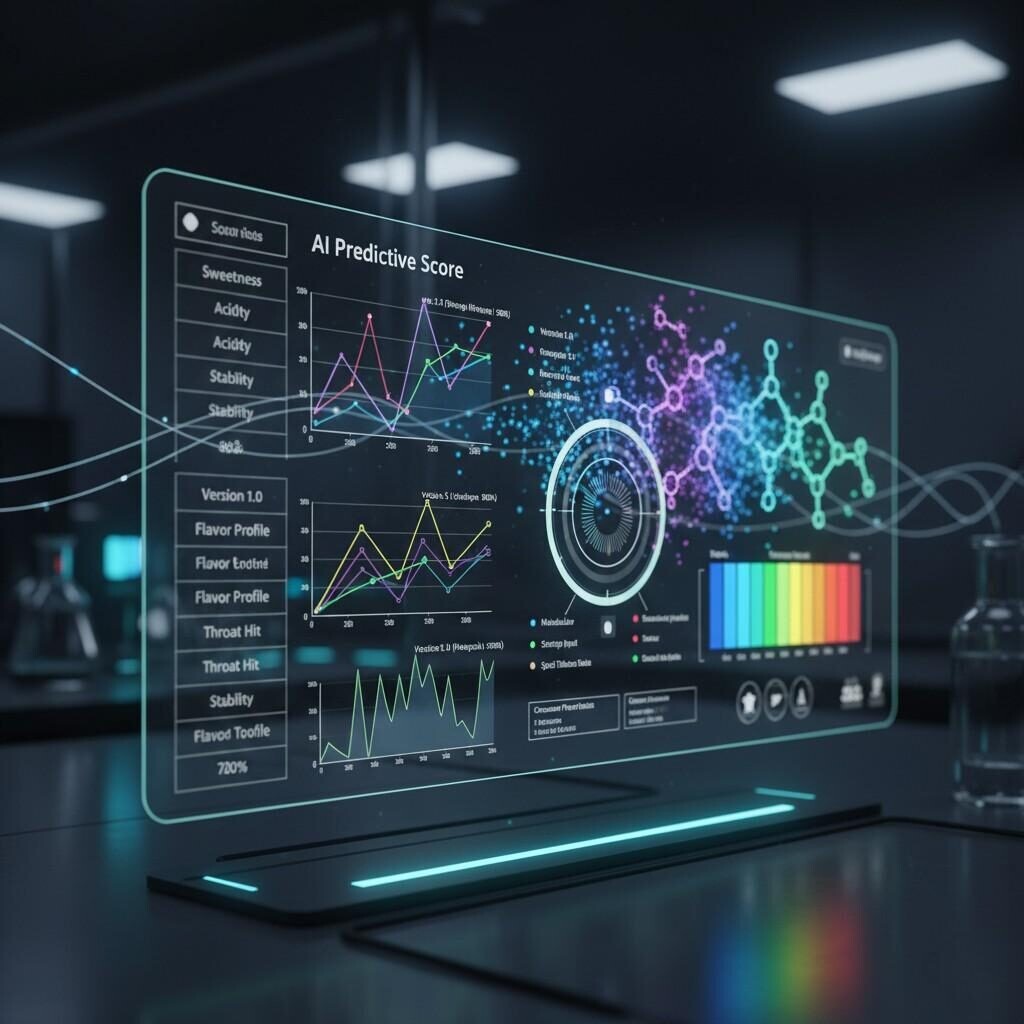Author: R&D Team, CUIGUAI Flavoring
Published by: Guangdong Unique Flavor Co., Ltd.
The e-liquid industry, a vibrant and rapidly evolving sector, stands on the precipice of a profound transformation driven by Artificial Intelligence (AI) and advanced search methodologies. For manufacturers of e-liquid flavors, this isn’t merely a technological upgrade; it’s a fundamental shift in how flavors are conceived, developed, and delivered to a discerning global market. The traditional art and science of flavor creation, long reliant on expert palates and iterative experimentation, is now being augmented and accelerated by the unprecedented analytical power of AI. This blog post delves into the intricate relationship between flavors and AI search, exploring how these synergistic forces are reshaping the landscape of e-liquid innovation, from predictive analytics to hyper-personalized consumer experiences.
The consumer landscape for e-liquids is dynamic, characterized by an insatiable demand for novelty, authenticity, and increasingly, personalization. Staying ahead of these trends requires not only creativity but also a robust ability to process vast amounts of data, identify emerging patterns, and anticipate future desires. This is where AI, particularly through its sophisticated search and analytical capabilities, becomes an indispensable tool. It moves flavor development beyond intuition, grounding it in data-driven insights that can predict success, optimize formulations, and streamline the entire production pipeline. As we unpack the multifaceted applications of AI in this domain, it will become clear that embracing these technologies is not just an advantage—it’s a necessity for sustained growth and leadership in the e-liquid flavor market.

AI Flavor Synthesis
At its core, AI search transcends traditional keyword-based queries. It encompasses a suite of advanced algorithms and machine learning models designed to understand context, identify relationships, and extract actionable insights from unstructured and structured data. For flavor development, this means moving beyond simple searches for “strawberry flavor” to complex analyses that can correlate chemical profiles with sensory perceptions, consumer preferences, and market trends.
Historically, flavorists relied on their extensive knowledge bases, internal databases, and sometimes, basic search functionalities within chemical registries to find relevant compounds or existing formulations. While effective to a degree, this process was often slow, limited by the scope of the immediate data available, and heavily dependent on the individual’s expertise. AI search, however, introduces a paradigm shift. It employs techniques such as natural language processing (NLP), semantic analysis, and machine learning to interpret vast datasets in a way that mimics human understanding, but at an unparalleled scale and speed.
For instance, an AI-powered search system can process thousands of scientific papers, patent filings, consumer reviews, and social media discussions to identify subtle correlations between specific flavor compounds and reported sensory attributes like “creamy,” “fruity,” or “refreshing.” It can then cross-reference this with demographic data, geographic location, and even psychological profiles to predict the likely success of a new flavor combination. This contextual understanding is crucial for navigating the complex interplay of ingredients and consumer preferences in e-liquids.
Several AI technologies are instrumental in revolutionizing flavor search:
The efficacy of AI search is directly proportional to the quality and quantity of the data it processes. For e-liquid flavor manufacturers, this means aggregating diverse data sources:
The challenge lies not just in collecting this data but in structuring it in a way that AI algorithms can effectively learn from and derive insights. Data cleansing, normalization, and integration are critical preliminary steps for any successful AI implementation in flavor development.

AI E-liquid Analysis
One of the most transformative applications of AI search in the e-liquid industry is predictive flavor modeling. This capability moves flavor development from a reactive, trial-and-error process to a proactive, data-driven approach, significantly reducing development time and costs.
Predictive flavor modeling leverages machine learning algorithms to forecast the sensory properties, consumer appeal, and even market success of new flavor combinations before they are physically created. The process typically involves:
Consider the challenge of optimizing sweetness and mouthfeel in an e-liquid. Traditional methods involve numerous iterations of mixing, tasting, and adjusting. A predictive AI model, however, could be trained on a dataset correlating concentrations of various sweeteners (e.g., sucralose, ethyl maltol) and mouthfeel enhancers (e.g., certain esters) with sensory panel ratings for perceived sweetness and texture. The model could then allow a flavorist to specify a target sweetness level and a desired mouthfeel, and immediately provide a range of formulations, complete with predicted sensory outcomes and the probability of consumer acceptance. This not only accelerates development but also reduces the amount of expensive raw materials used in experimentation.
An emerging concept in predictive modeling is the creation of “digital twins” for flavors. A digital twin is a virtual replica of a physical product or process. In this context, it would be a comprehensive digital representation of a flavor, encompassing its chemical structure, sensory profile, stability characteristics, and even its predicted interaction with different e-liquid bases. AI search tools would allow flavorists to query and manipulate these digital twins, exploring hypothetical modifications and observing their predicted effects without needing physical samples. This simulation-driven approach represents a significant leap forward in efficiency and innovation.
Beyond internal R&D, AI search is a powerful instrument for understanding the external market—consumer preferences, emerging trends, and competitive landscapes. This external intelligence is critical for developing flavors that resonate with the target audience.
AI-powered social listening platforms can monitor millions of online conversations across social media, forums, blogs, and review sites. NLP and sentiment analysis algorithms then process this unstructured text data to identify:
AI can analyze sales data, search queries, and social media discussions to identify geographic and demographic variations in flavor preferences. For example, an AI system might reveal that citrus flavors are particularly popular in warmer climates, while rich dessert flavors gain traction in colder regions or among specific age groups. This granular understanding allows manufacturers to tailor flavor offerings to specific markets, maximizing their appeal and sales potential.
By combining internal sales data, external market reports, and social media trends, AI models can forecast future market demand for specific flavor profiles. This helps manufacturers optimize production schedules, manage inventory, and make informed decisions about investment in new flavor lines. For example, if an AI predicts a surge in demand for tropical fruit blends in the next quarter, a manufacturer can proactively scale up production of relevant flavor concentrates.

AI Supply Chain Compliance
The e-liquid flavor industry operates within a complex web of supply chain logistics and stringent regulatory requirements. AI search offers powerful tools to navigate these complexities, ensuring efficiency, compliance, and risk mitigation.
AI-powered search can optimize the entire ingredient sourcing process:
Regulatory compliance is paramount in the e-liquid industry, with evolving guidelines from bodies such as the Food and Drug Administration (FDA) in the United States, the European Food Safety Authority (EFSA), and other regional authorities. AI search tools are invaluable in this domain:
Citation 1: The complexity of food and flavor regulations is highlighted by organizations like the European Food Safety Authority (EFSA), which continuously publishes scientific opinions and guidance on food additives and flavorings, underscoring the dynamic regulatory landscape that manufacturers must navigate. (Source: www.efsa.europa.eu)
Looking ahead, AI search and its associated technologies are poised to unlock unprecedented levels of personalization and innovation in e-liquid flavors, moving towards a future where flavor experiences are truly bespoke.
Imagine an e-liquid flavor tailored precisely to an individual’s unique preferences, dietary needs, and even genetic predispositions. AI makes this vision tangible:
The universe of potential flavor molecules is vast, and traditional discovery methods are often slow and expensive. AI, particularly through techniques like computational chemistry and generative adversarial networks (GANs), can dramatically accelerate this process:
Citation 2: The potential of AI in accelerating scientific discovery, including the identification of novel compounds, is widely acknowledged in academic literature, with studies frequently appearing in journals like Nature and Science detailing AI’s role in chemistry and materials science. (Source: Reputable scientific journals and academic databases)
AI is also revolutionizing how flavors are evaluated and maintained for quality:
Citation 3: The application of AI in sensory science, particularly with e-noses and e-tongues, is a growing field. Research by institutions like the Monell Chemical Senses Center demonstrates how computational methods are enhancing our understanding and objective measurement of taste and smell. (Source: www.monell.org)
While the promise of AI in flavor development is immense, its implementation is not without challenges. Addressing these will be crucial for successful adoption.
The adage “garbage in, garbage out” applies emphatically to AI. High-quality, clean, and comprehensively labeled data is essential for training effective models. For many flavor manufacturers, consolidating disparate datasets, ensuring consistency, and filling data gaps can be a significant undertaking. Investment in robust data management systems and practices is a prerequisite for AI success.
Implementing and managing AI systems requires specialized skills in data science, machine learning, and AI engineering, alongside deep domain expertise in flavor chemistry and sensory science. Bridging this expertise gap, either through upskilling existing staff or recruiting new talent, is a critical challenge. Collaboration with AI solution providers can help mitigate this.
Training and deploying advanced AI models, especially deep learning networks, can demand substantial computational resources. Cloud-based AI platforms offer scalable solutions, but understanding and managing these costs is important.
AI models learn from the data they are fed. If this data contains biases (e.g., historical preferences reflecting only a narrow demographic), the AI’s predictions may perpetuate or even amplify these biases. For example, if past consumer data predominantly comes from a specific age group, the AI might inadvertently optimize flavors for that group, overlooking opportunities in other segments. Manufacturers must be mindful of data diversity and implement strategies to detect and mitigate algorithmic bias to ensure equitable and broadly appealing flavor development. Furthermore, as AI begins to suggest entirely novel molecules, ethical discussions around the long-term safety and environmental impact of these compounds will become increasingly relevant.
It is crucial to remember that AI is a tool to augment human creativity and expertise, not replace it. The nuanced art of flavor creation, the spark of inspiration, and the subjective validation of a human palate will always remain indispensable. AI search and predictive modeling empower flavorists by providing them with powerful insights and tools to explore possibilities more efficiently, but the final creative direction and critical assessment will continue to reside with human experts. The most successful implementations will foster a symbiotic relationship between AI and human flavorists, where each brings their unique strengths to the innovation process.
Citation 4: The concept of AI as an augmentative tool, working in collaboration with human experts rather than replacing them, is a cornerstone of modern AI strategy, emphasized by organizations like the World Economic Forum in discussions on the future of work and industry transformation. (Source: www.weforum.org)

Tech Cooperation for Future Flavors
The convergence of flavors and AI search represents a watershed moment for the e-liquid industry. From accelerating R&D and predicting market trends to optimizing supply chains and ensuring regulatory compliance, AI offers a potent suite of capabilities that can transform every facet of flavor creation. Manufacturers who strategically adopt these technologies will not only gain a significant competitive edge but will also be instrumental in shaping the future of personalized, innovative, and responsible e-liquid flavor experiences. The journey into this AI-driven flavor frontier requires vision, investment, and a commitment to continuous learning, but the rewards—in terms of efficiency, innovation, and market leadership—are unequivocally compelling. As the e-liquid landscape continues to evolve, AI will be the compass guiding the next generation of taste sensations.
Are you ready to unlock the full potential of AI in your e-liquid flavor development? We invite you to connect with our team of flavor experts and AI specialists.
Contact Us Today to Transform Your Flavor Portfolio!
📩 [info@cuiguai.com]
📞 [+86 189 2926 7983]
🌐 Explore more at 【www.cuiguai.com】
The business scope includes licensed projects: food additive production. General projects: sales of food additives; manufacturing of daily chemical products; sales of daily chemical products; technical services, technology development, technical consultation, technology exchange, technology transfer, and technology promotion; biological feed research and development; industrial enzyme preparation research and development; cosmetics wholesale; domestic trading agency; sales of sanitary products and disposable medical supplies; retail of kitchenware, sanitary ware and daily sundries; sales of daily necessities; food sales (only sales of pre-packaged food).
Copyright ©Guangdong Unique Flavor Co., Ltd.All Rights Reserved. Privacy Policy